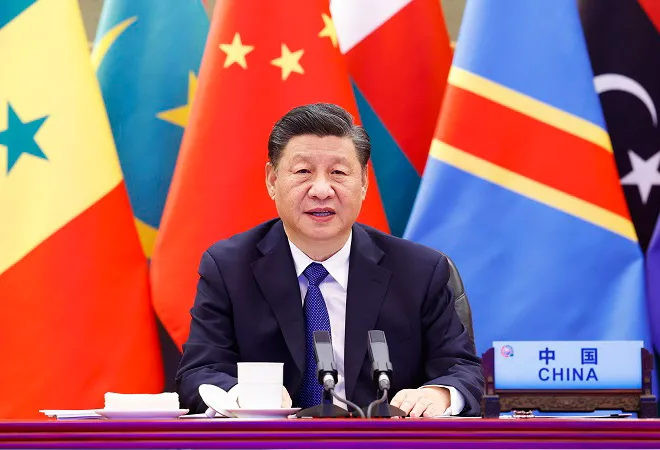
At the 20
th National Congress of the Communist Party of China (CPC) on 22 October 2022, Xi Jinping, the President of the People’s Republic of China (PRC), predictably secured the
third successive term as the General Secretary of the CPC. This has earned him unparalleled stature among the Chinese leaders next only to Mao Zedong. Xi Jinping has also emerged as a much stronger leader because he has been able to induct his loyalists in the seven-member
Politburo Standing Committee. After such an emphatic endorsement of his leadership as well as policies, the Xi Jinping-led regime, by 2049, wants to ensure that, “
China leads the world in terms of composite national strength and international influence.” Since Xi assumed power in 2012, China has had a conspicuous footprint in Africa. With his overwhelming powers, his regime will certainly continue to shape China’s Africa policy in its own image. It will be worth reflecting on the Sino-African ties to foresee the likely trajectories of the Chinese role in Africa.
Xi Jinping has also emerged as a much stronger leader because he has been able to induct his loyalists in the seven-member Politburo Standing Committee.
To lead the world, Xi believes that the PRC will have to reintegrate the strategically significant territory of Taiwan within itself, to ensure that China is able to counter the American power in the entire Pacific region. China has succeeded in its bid to promote the One China policy in Africa due to its support to anti-colonial and anti-racist movements since the 1950s. The then Chinese Premier,
Zhou En Lai, had gone on a 10 nation diplomatic tour in Africa in a good will mission in 1963-1964. In 1971, owing to the support of
26 African member states at the United Nations General Assembly, it was easier for China to earn its lawful place as a member of the UN. Subsequently, in the mid-1970s, China had also completed the
Tan-Zam railway line that linked Zambia to Tanzania. It allowed Zambia an access to the sea for its exports. Currently, among the 54 African states, only
Eswatini (formerly Swaziland) still recognises the Republic of China/Taiwan. In spite of it, China has vibrant economic ties with all 54 African states.
Similarly, when the Chinese government suppressed the Tiananmen Square protest for democracy in 1989, countries such as Egypt, Burkina Faso, and Angola supported it while a majority of the African countries refrained from condemning the Chinese official policies. As the Western world was getting critical of China’s dismal human rights records, China found its support in Africa. China’s engagement with Africa intensified after the 1990s as it did not insist on applying conventional Western norms concerning a record on human rights or democratic governance while forging its multi-layered ties in Africa. This was quite evident when China perpetuated its ties with the autocratic regimes of
Robert Mugabe (1980-2017) and
Omar-al Bashir (1989-2019) in resource-rich countries like Zimbabwe and Sudan, respectively.
In essence, Xi Jinping’s pragmatic thrust to secure the dominant place for China in Africa under globalisation has largely guided China’s Africa policy. Indeed, China’s quest to achieve military might, rapid economic growth, and speedier material advancement of its people has prompted the country to widen and deepen its role in Africa.
China’s engagement with Africa intensified after the 1990s as it did not insist on applying conventional Western norms concerning a record on human rights or democratic governance while forging its multi-layered ties in Africa.
At the macro level, China’s role in Africa on security-related areas has already grown and will get further consolidated in the future. China has signed
27 loan deals with eight African countries worth
US $3.5 billion, between 2000 to 2020, for defence spending. African countries have 70 percent of
armoured vehicles and 20 percent of
military vehicles supplied by China. According to a study, from 2013 to 2017, China accounted for
70 percent of the African arms imports, and from 2015 to 2020,
55 percent. Even though China has emerged as a major supplier of arms and security technology, critics point out that the country is transferring arms to
rogue regimes that flout international norms. Besides, since 2017, China has developed a major military base in
Djibouti, a strategically located area in the horn of Africa.
In the realm of economy, China has been coordinating its ties through the
Forum On China- Africa Cooperation (FOCAC). Launched in October 2000, the FOCAC is evolving as a major forum of tri-annual multilateral dialogue between China and 54 African states to promote development cooperation. Additionally, China’s
Belt and Road Initiative (BRI), a multi-billion transcontinental investment infrastructure project of
US $1trillion has flourished under Xi Jinping in Africa. China is also building digital infrastructure in Africa. So far,
46 African countries have been signatories of the BRI, which constitutes one billion people. The BRI is executing infrastructure projects in
43 African countries at an average of 2.8 years, which is much less time than other donor agencies like the African Development Bank or the World Bank. The Xi Jinping regime is likely to further consolidate its ties with African countries through FOCAC and BRI. Although the critics perceive BRI as a vehicle of China’s
debt trap diplomacy to
hoodwink the borrowers, it needs a more nuanced appraisal. Such critics virtually deny African countries their agency and capacity to bargain between diverse contending powers such as the United States, China, India, France, etc that are in the fray to enhance their influence in Africa.
At the same time, it can be safely argued that China’s relationship with the continent of Africa, as a whole, is and will continue to be asymmetrical. China continues to be Africa’s
largest trading partner, bilateral creditor, and among the most significant source of infrastructure investment/development. With the EXIM Bank of China promoting trade and investment in Africa, by 2021, the value of China’s trade with the latter became an all-time high of
US$ 254 billion. However, it should be noted that in 2020, China’s trade with Africa was only
four percent of its total world trade, which was less than China’s trade with Germany. Most African countries have a trade deficit with China. Only three commodity exporting countries including South Africa, Congo, and Angola have accounted for
62 percent of exports from Africa. Similarly, in 2019, out of total direct investments flows (FDI),
only 2.9 percent of the Chinese FDI went to Africa. In contrast, China accounted for
16.4 percent for Africa’s total trade. There was no direct investment from African countries to China, but the latter accounted for
US$ 153 billion cumulative loans to African countries from 2000-2019.
China’s Belt and Road Initiative (BRI), a multi-billion transcontinental investment infrastructure project of US $1trillion has flourished under Xi Jinping in Africa.
China’s energy hungry economy has been wooing countries that have abundant energy reserves in oil such as Sudan/South Sudan, Angola, and Nigeria. As far as key strategic resources are concerned, China continues to have virtual monopoly over
cobalt mining in Africa. Cobalt is an essential material for the production of electric vehicles and roughly 70 percent of the world’s cobalt is mined in Congo. China’s dominance over cobalt mining can be emphasised by the fact that in 2020
. In 2007, President Joseph Kabila of Congo had
swapped mining interests for infrastructure projects. However, Nevertheless, Africa has wide networks of Chinese State-Owned Enterprises (SOEs) and private firms.
McKinsey & Company, a consultancy firm, has estimated that there are
about 10,000 Chinese firms active in Africa that earn profit margins of over 20 percent. This number far exceeds the firms that are officially registered under the Department of Commerce in China. The SOEs, by and large, represent big firms, and along with them, there are a large number of private firms. Such firms have a notable presence in construction as well as manufacturing industry. Moreover, Transsion, a Chinese private firm, owing to
superior marketing and its understanding of
African consumers’ requirement has emerged as the dominant company in mobile phone market.
Furthermore, China’s soft power is being displayed through roughly 60
Confucius Institutes that are currently functional in Africa. Through the spread of Chinese language, culture, and educational exchange programmes, China is building bridges with Africa on a people-to-people level. Further, the
Chinese migrants have also steadily increased in Africa.
As the most dominant external power in Africa, China has already played an expansive role under Xi Jinping’s leadership. As time passes, in each of the areas such as security, economy, development, trade, investment, and soft power, China is likely to consolidate and further expand its role in Africa in its mission to lead the world.
The views expressed above belong to the author(s). ORF research and analyses now available on Telegram! Click here to access our curated content — blogs, longforms and interviews.



 At the 20th National Congress of the Communist Party of China (CPC) on 22 October 2022, Xi Jinping, the President of the People’s Republic of China (PRC), predictably secured the
At the 20th National Congress of the Communist Party of China (CPC) on 22 October 2022, Xi Jinping, the President of the People’s Republic of China (PRC), predictably secured the  PREV
PREV


